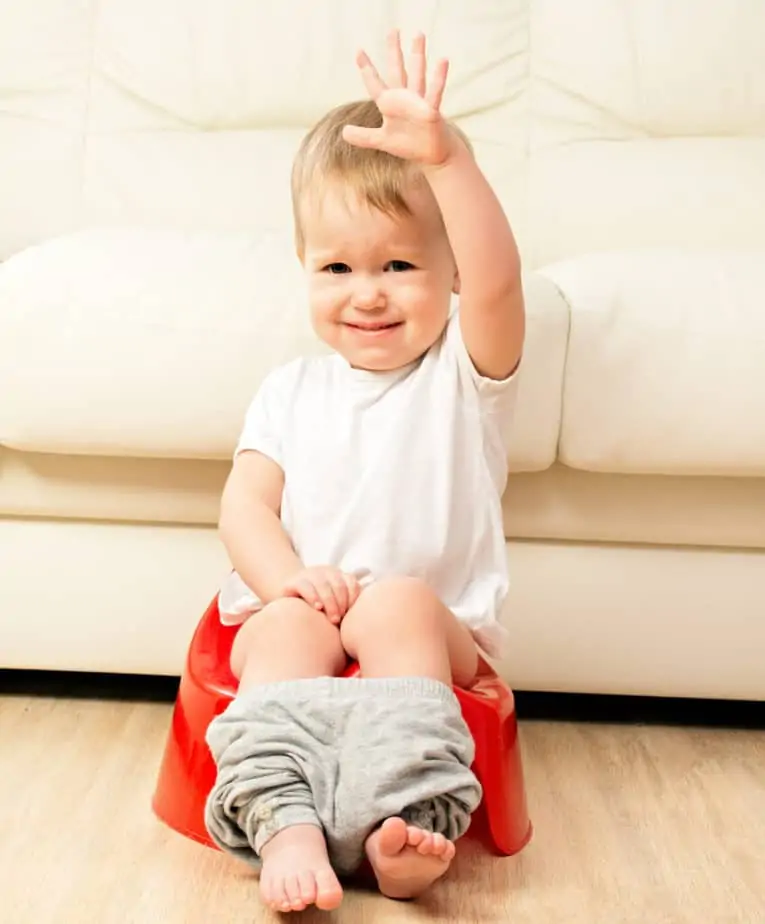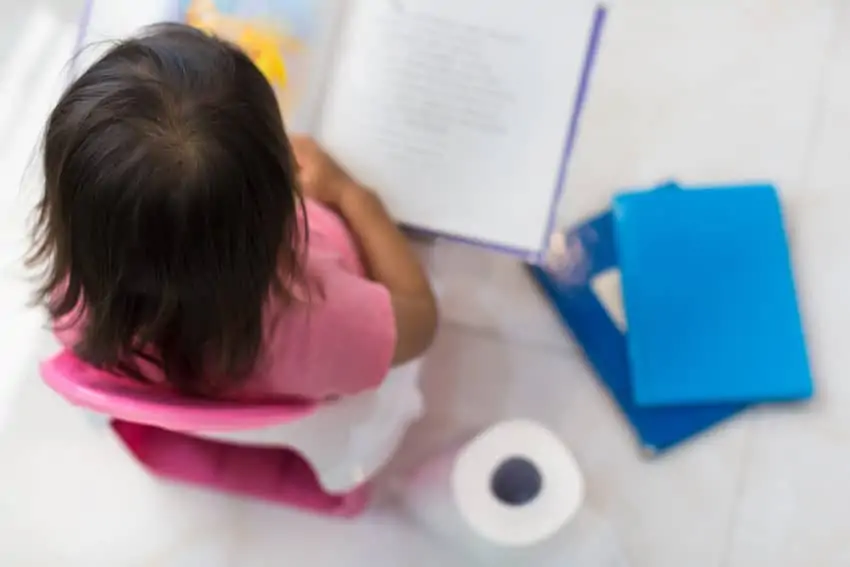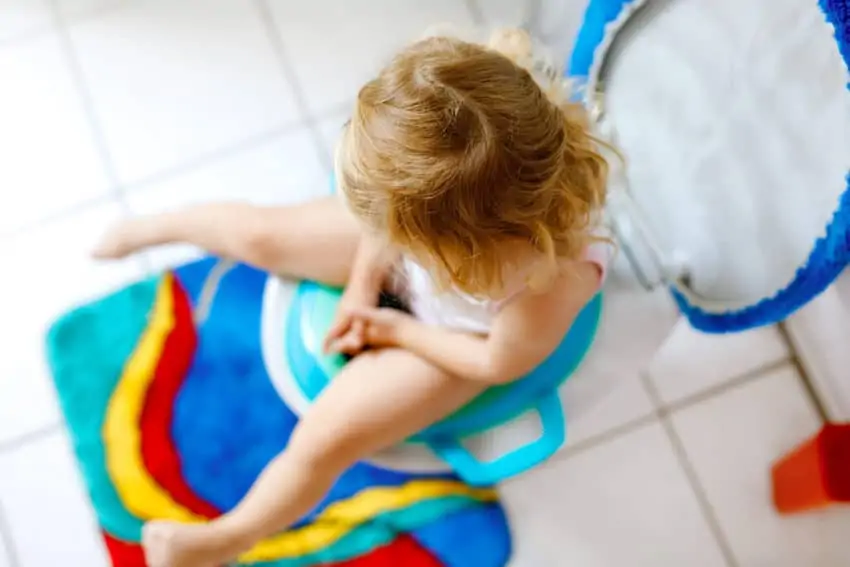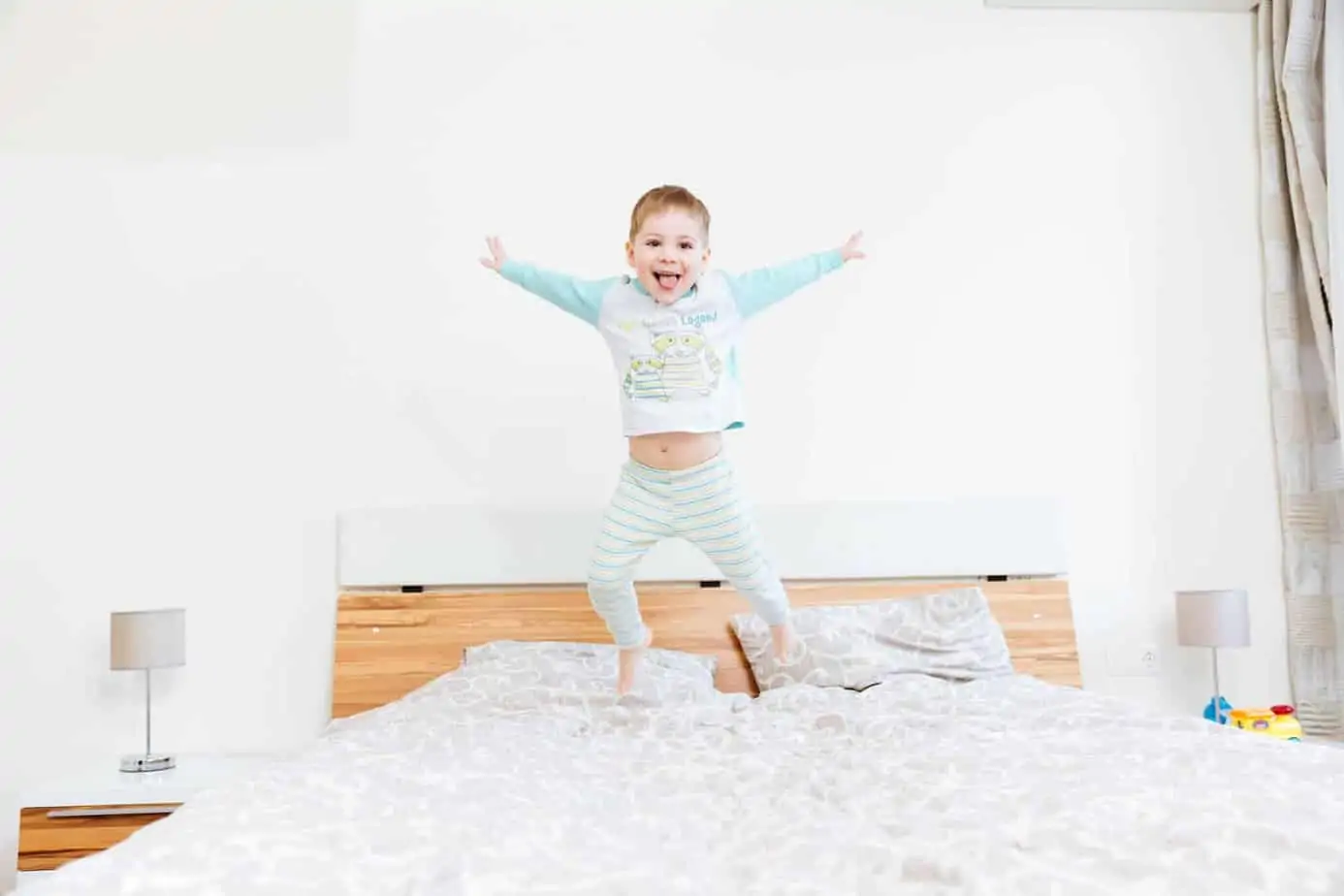You thought the hard work of potty training was behind you. Then, your child starts having accidents and seems to be taking a few steps back. Is it just a phase? Is it potty training regression? Here’s what you need to know about identifying potty training regression, its causes, and how to work through it!

There are certain milestones that most parents long for: first birthday, first steps, first words, and…potty training.
Getting rid of the diapers and making that one small step toward independence is great, right?
When I was potty training my children, we made positive forward progress to the point where my son was only wearing pull-ups at night.
We finally crossed the finish line!
Unfortunately, a short time later, my son had an accident. And then he had another accident, followed by another and another. I felt frustrated, confused and wondered what I had done wrong.
What is Potty Training Regression?
I made the same mistake that many parents make: seeing the process of potty training as a linear, forward-moving process with a clear start and finish.
However, that’s not the case. While potty training regression is frustrating for parents, it’s actually a very common occurrence.
So, what exactly is a regression in potty training?
Is bed-wetting considered potty training regression?
Learning to use the bathroom is a milestone that differs during awake hours and sleeping hours. When kids are awake, they are more aware of the signals that their body gives them. However, when they’re sleeping, additional factors such as brain development, bladder size, and how deeply a child sleeps all plays a role in potty training through the night.
This is why bed-wetting alone isn’t considered to be potty training regression.
–> Dry nights often take longer to master than dry days.
True regression occurs when kids who once were potty trained during the day start regularly having accidents – sometimes even to the point of needing to wear diapers again.
It can be enough to make a parent want to cry.
Possible Causes Of Potty Training Regression
Why does this happen? Let’s check out the common causes. Once you can figure out the cause, then you can handle it and go back to your forward-moving momentum in potty training.
Medical Issues
Before honing in on any other possible cause, verify that your child isn’t dealing with any physical health issues that might be causing this potty training regression. Potential issues that could have an impact include urinary tract infections and constipation, among other issues.
Check with your child’s pediatrician to rule these possible factors out!
They Feel Stressed
Another common cause of potty training regression is the presence of some sort of stressor in your child’s life. That may be some sort of upheaval, including:
- Moving to a new house
- A new sibling
- Parents’ divorce
- A death in the family
- Illness
- Starting a new preschool
They’re Distracted
Some kids can become completely engrossed in their play or other activities…to the point where they don’t realize they have to go until it’s too late.
This was the cause of my own son’s potty training regression.
Anxiety
Some kids are just plain scared of the potty. The loud flushing sound scares them. They imagine there’s a monster in the toilet, or they’re worried they may fall in.
How To Work Through Potty Training Regression
There’s good news for all the parents experiencing this right now: regression episodes are usually short-lived. Yes, it’s frustrating, but here are some tips to work through it and get to the other side.
Talk With Your Child
Keep in mind that they’re young and probably don’t have the words to fully express what they’re feeling. However, if you can sit down with your child and talk about what’s bothering them, you may be able to get enough clues to help you figure out what the problem is.
Validate Their Feelings
After your child expresses what they can, take the time to show them that you heard their feelings. For example, if there has been the recent addition of a sibling, your child will likely be feeling left out and that they aren’t getting the attention they used to.
Make an effort to reduce talk of being a sibling and instead spend time with them, reading with them, playing with them, etc., when the baby is sleeping.
Remain Positive
This is where the best thing you can do is stay calm and patient. Avoid punishing your child for having accidents because it may lead to more anxiety.
Instead, take the approach of not making a big deal out of the accident while making a really big deal (in a good way!) out of using the potty successfully.
When accidents happen, simply say something like “Uh oh, let’s go get on the potty” and leave it at that.
Go Back To Giving Reminders
If it feels like you’re going back to the beginning of potty training, in a sense, you are. But, there is good news! Even though you’re going backward, it’s temporary and won’t take as long to make great forward progress.
Make sure you give your child frequent reminders to go to the potty. Just make it part of your daily routine.
When my son went through this, I found that giving a reminder every couple of hours seemed to work well. I simply set a timer on my phone to do it even if I was busy doing something else at the time.
Don’t forget to get everyone in your child’s life on board with this. It will make the process that much faster—teachers, grandma, the babysitters…everyone.
You could also pull out your potty training books and reread them with your child!
Give Praise And Rewards
External rewards work well as incentives to strive toward a goal, which also applies to potty training regression. Try implementing a rewards system. We did that with my son and found that this really helped him stay motivated to “get back on track”.
Here’s what we did.
We came up with a sticker system. We had a piece of paper that had a chart on it. For every day that he didn’t have an accident, I let him put a sticker on the paper. After he got 5 days of stickers in a row, he got to pick his favorite flavor of ice cream.
Once he did that, we repeated the process but increased both the number of days he had to get in a row as well as the prize. We upped it to 7 days, and the prize was a new pack of super fun underwear that he got to pick out (plus some sidewalk chalk). After that, he was almost back on track.
I recommend getting your child’s input on this because if you choose something they don’t care about as a reward, they won’t be motivated to work for it. For example, they may want extra stories at bedtime, and you’re offering ice cream!
Note: For some kids, rewards systems can have the opposite effect and can actually cause stress or anxiety. If you feel that’s happening with your child, I recommend abandoning the rewards system completely and just using enthusiastic praise.
Related: 11 Helpful Charts for Kids: Chores, Reward & Daily Routines to Help Kids Thrive
The Takeaway
Many potty training regressions only take a couple of weeks or so to straighten out, but sometimes it can take a month or so.
If it lasts longer than that and you haven’t seen a doctor, it might be time to consider checking in with your child’s pediatrician to ensure there isn’t an underlying physical problem.
Hang in there and stay the course…you will get to the other side soon!
More Positive Parenting Inspiration
- Potty Training Tips 101: The Ultimate Guide for Successful Potty Training
- The Best Potty Training Books To Read (For Parents and Toddlers)
- 11 Helpful Charts for Kids: Chores, Reward & Daily Routines to Help Kids Thrive
- Tips to Help You Flush Potty Talk & Bad Words Down the Drain
- Set the Tone for a Happy Home: Create a Positive Home for your Kids
- Create a Routine: 6 Sample Toddler Schedules from Real Moms
- 8 Tips for Surviving the (Hard) 18 Month Sleep Regression
- Sleep Regressions: What You Need to Know to Survive Them
Want even more?
Shop All Parenting Resources
Shop all of our parenting resources from self-regulation tools and managing big emotions to building self esteem and confidence. There are resources for all seasons of life!








